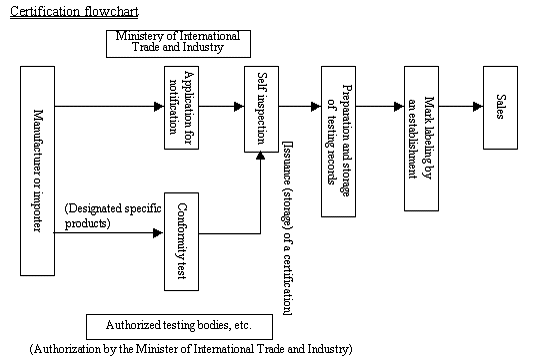The objective of this law is to ensure safety, to impose state regulations on dangerous consumer products, and to promote autonomous activities on the part of private groups to ensure the safety of consumer products, and thereby to protect the interests of the general public.
(2) OUTLINE OF THE LAW AND SYSTEM
Consumer products which are deemed likely to cause danger or injury to general consumers are designated as Specified Products. Of these products, those which have been deemed insufficient for manufactures or importers to secure quality necessary to prevent danger to the general public are designated as special category of specified products. For former products self-recognition (obligation to conform to technical requirements) is required, and for latter products control was carried out through the obligation of third-party conformity accessment. Products satisfying safety standards are required to label so (Product Safety of Consumer Products; PSC labelling), and thus sale of products without such label is prohibited.
(3) CABINET ORDER AND MINISTERIAL ORDINANCES
Enforcement Order of the Consumer Product Safety Law
Enforcement Regulations of the Consumer Safety Law
Ministerial Ordinance on Reports from Prefectural Governors as Provided in Paragraph 2 of Article 10 of the Enforcement Order of the Consumer Product Safety Law
(4) OUTLINE OF THE CONTROL
1) Items Covered
i. Specified products (other than special category of specified product)
Household pressure cookers and pressure pans, protective helmets for vehicle users, cribs, mountain claiming ropes
ii. Special category of specified products
Cribs, portable lased applied appliances and warm water circulatory organ for bathtubs are stiputated as special category of specific products.
2) Outline of technical requirements and conformity assessment procedures
i. Content of the Control
Ministerial ordinances of the Ministry of Economy, Trade and Industry Concerning Technical Requirement of Specific Products prescribe the technical requirements and conformity assessment procedures (Articles 3 and 14).
Although international standards related to specified products do not exist, Japan shall adopt the establishment of these. It is stipulated that testing body related to specific category of specified products is to be registered by a competent minister.
Authorized conformity assessment body: any person who intends to conduct a conformity test in domestic establishments
Approved conformity assessment body: any person who intends to conduct a conformity test in overseas establishments
ii. Certification System
(a) As for specific categoty of specified products, a manufacturer, etc. shall take a conformity test conducted by conformity assessment agencies registered by the responsible Minister. Its duty shall be to prepare and preserve testing records (Article 11 and 12).
(b) If specific manufactured or imported products do not conform to technical requirements, when deemed necessary in order to prevent the occurrence of danger or trouble, an order to prohibit labeling of a type of the relevant specific products may be made (Article 15).
(c) The above-mentioned conformity test shall be implemented by a registered conformity assessment body (Articles 16 and 29).
(d) The maximum punishment for a juridical person violating an order to prevent danger, etc. shall be a fine of not exceeding one hundred million yen. Other penal provisions shall be improved (Articles 97through 100).

iii. Registered conformity testing bodies
Any entity who wishes to be registered as a registered conformity testing body is requested to apply for the Minister of Economy, Trade and Industry. The Minister, when deemed necessary, may let National Institute of Technology and Evaluation to evaluate whether such an application is in conformity with the standards of regisration.
.
(5) HIGHLIGHTS OF THE RECENT AMENDMENT
. After the amendment of Consumer Products Safety Law in October, 2000, all products subject to the law is required to lable the relevant new mark. Transition period was set for products with the old mark in the marketplace, but currently all the relevant products for sale must be attached with the new mark.
(6) REFERENCE INFORMATION
(Liaison Offices for Further Information)
Product Safety Division, Consumer Affairs Department, Commerce and Information Policy Bureau,
Ministry of Economy, Trade and Industry
Tel: 03-3501-1511 (representative) http://www.meti.go.jp